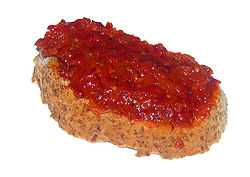Zacuscă
| Zacuscă | |
|---|---|
| Spread | |
 Zacuscă on bread | |
| Place of origin: | |
| Romania | |
| Main ingredient(s): | |
| Eggplants or cooked beans, roasted red peppers (gogoşari cultivar) | |
| Recipes at Wikibooks: | |
|
| |
| Media at Wikimedia Commons: | |
|
|
Zacuscă (Romanian pronunciation: [zaˈkuskə]) is a vegetable spread popular in Romania. Similar spreads are found in other countries throughout, or bordering, the Balkans.
Recipe
The main ingredients are roasted aubergine or sauteed onions, tomatoes, roasted red peppers (belonging to a local cultivar called gogoşari)[1] and chopped onion.[2] In North America gogosari are not cultivated unless on very limited heirloom areas, but can be replaced with the regular bell peppers found in grocery stores, the flesh being similar but lacking the sweetness of the cultivar. Some add mushrooms, carrots, or celery. Other ingredients are also added according to taste, including spices. Traditionally, a family will cook a large quantity of it after the fall harvest and preserve it in sterilized jars. The basic recipe is: sauteed chopped onion, roasted (on a fire), peeled and chopped eggplant, roasted bell peppers and sauteed peeled chopped tomatoes, to which various variants (vegetables like mushrooms) are added. The prepared vegetables are then mixed, then peeled chopped garlic cloves are added (lots of garlic). Canning jars are then filled with the mix then sterilized by simmering for a couple of hours in a double boiler or bain-marie. The jars are then covered with a blanket and let cool off for a couple of days, then stored in a cool dry dark place (pantry, root cellar, NOT fridge).
It can be eaten as a relish or spread, typically on bread. It is said to improve in taste after some months of maturing but must be used within days of opening. Although traditionally prepared at home, it is also commercially available. Some Bulgarian and Middle Eastern brand-names are available in the United States.
| This article is part of the series |
| Romanian cuisine |
|---|
|
Soups
|
|
Appetizers & Salads
|
|
Dishes
|
|
Delicatessen
|
|
Cheeses
|
|
Breads
|
|
Desserts
|
|
|
Etymology
The word zacuscă is of Slavic origin (compare Russian: закуска, zakuska),[1] which means simply "appetizer" or "snack".[3]
See also
- Ajvar and Pinđur, similar relishes from Serbia
- Lutenica, another similar relish from the Balkans
- Ajika, a Caucasian dip based on a boiled preparation of hot red peppers, garlic, herbs and spices
- Biber salçası, a Turkish spread made from red peppers alone
- Matbucha, a Middle Eastern cooked salad of tomatoes and bell peppers
- Muhammara, a hot pepper dip in Levantine cuisine
- Meze
References
- ↑ 1.0 1.1 Zacusca on DEX Online Dictionary
- ↑ Basic zacusca recipe
- ↑ Vladmir Dal's Russian dictionary online
External links
- (Romanian)how to make zacusca with photos
- Making zacusca step by step, with photographs
- Zacusca (recipe)